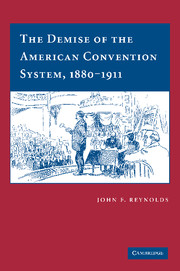Book contents
- Frontmatter
- Contents
- Acknowledgments
- Abbreviations
- The Demise of the American Convention System, 1880–1911
- 1 Introduction
- 2 The Search for Harmony: The Convention System in the Party Period
- 3 The Emergence of the Hustling Candidate
- 4 Coping with Competition: The Limitations of Party Self-Regulation
- 5 “The Pivot of Reform”: Debating the Direct Primary
- 6 The Direct Primary in the Reform Tradition
- Appendixes
- Bibliography
- Index
3 - The Emergence of the Hustling Candidate
Published online by Cambridge University Press: 18 August 2009
- Frontmatter
- Contents
- Acknowledgments
- Abbreviations
- The Demise of the American Convention System, 1880–1911
- 1 Introduction
- 2 The Search for Harmony: The Convention System in the Party Period
- 3 The Emergence of the Hustling Candidate
- 4 Coping with Competition: The Limitations of Party Self-Regulation
- 5 “The Pivot of Reform”: Debating the Direct Primary
- 6 The Direct Primary in the Reform Tradition
- Appendixes
- Bibliography
- Index
Summary
After his name was presented to California's Republican State Convention as a candidate for governor in 1861, Leland Stanford mounted the podium. He was acutely conscious that this was not the first time he stood in line for party favor. Conventions past had nominated Stanford for state treasurer and governor, but he wanted it clearly understood that ambition had nothing to do with it. “I never was a candidate for the nomination upon my own motion…. I did not solicit those nominations, but I submitted because I was devoted to the principles of our party. (Applause.) I felt it was my duty, as it was the duty of every man, to serve when called upon in times of trial.” Stanford assured the assembly that this was no less true in 1861. “No gentleman in this convention has ever received a letter in regard to this gubernatorial contest, [sic] from me during my absence from the State. There is not to-day, in this convention, a gentleman who ever received a letter from me in regard to it.” The impetus for his candidacy originated elsewhere. “My friends insisted that my name should come before the people, and so I have consented.” He closed by reminding his listeners that “This is not a struggle between men, we are here to-day for the purpose of sustaining principles.”
Raw political ambition was still a vice in the eyes of many nineteenth-century Americans.
- Type
- Chapter
- Information
- The Demise of the American Convention System, 1880–1911 , pp. 62 - 104Publisher: Cambridge University PressPrint publication year: 2006



